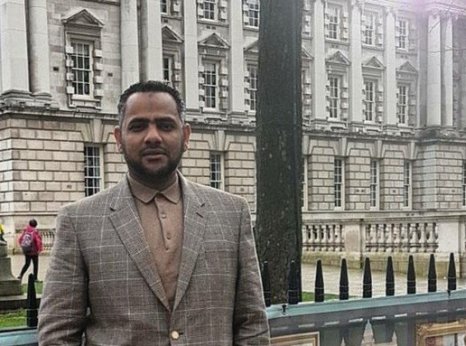Saudi Arabia: Upcoming Hearing For Detained British National

Ahmed al-Doush is currently being held in al-Hair Prison in the capital Riyadh.
Amnesty International has documented the Saudi authorities’ increasing crackdown on freedom of expression, targeting both citizens and foreign nationals, many of whom have been sentenced to lengthy prison terms solely for peacefully exercising their right to freedom of expression.
Ahmed al-Doush was assigned a court-appointed lawyer at his first hearing on 27 January 2025, but he is not permitted regular communication with him. Ahead of the hearing, he did not have a lawyer present, and he said he only realized he was being brought before a judge when he arrived. He faced a second trial hearing on 4 March 2025, again without prior notice, and another hearing on 13 April. During this hearing, a judge indicated that a judgment would be issued in his case in late April, raising fears that he may soon be sentenced.
As a result of restrictions by prison authorities to what he can share with his wife during his phone calls with her, which he communicated to her in April 2025, she has not received detailed information about his court proceedings, including details regarding the charges and evidence against him, the penalties he may face, nor updates on prison conditions or his health. In a call to his wife in April, he relayed that he had been instructed by prison authorities to only check in with her and the children during the calls, and that if he spoke about anything outside of this, including discussing anything about his conditions of detention, health or about the legal proceedings or charges against him, that the call would be terminated and there would be punishment.
For two and a half months after his arrest on 31 August 2024, Ahmed al-Doush's family was denied any communication with him. They were also not given information about his situation or the reason for his arrest. His wife and children were left in the dark about his well-being, his conditions of detention and whether and when he might be allowed to return home. He was also denied consular access to UK government representatives during this time, severely hindering the UK government and his family’s ability to gather information about him, his detention and steps they might take to facilitate his release.
It wasn’t until 17 November 2024 that Ahmed al-Doush was allowed a call to his wife. He was then permitted weekly phone calls with his family. However, in January, these calls were interrupted and have now become sporadic. He later told his family that his communication with them was restricted by the authorities as punishment for asking his wife during a call about people that had recently been released in Saudi Arabia.
Ahmed al-Doush was subjected to extensive interrogation without a lawyer present and before being informed of the charges against him. During interrogations, he was reportedly told that if not for his social media activity, he would be home with his family. Notably, his X account has only 37 followers and a total of four posts.
Since his arrest, Ahmed al-Doush has been permitted three consular visits from the British embassy in Riyadh, with the first consular visit on 21 November 2025, nearly three months after his arrest. Ahead of the visit, the UK government did not share any information known about his detention, status or well-being with his family, claiming this was on the grounds of data protection.
Legal proceedings in these cases fall far short of international fair trial standards. Individuals are often held incommunicado without charge, in solitary confinement, and denied access to lawyers or the courts to challenge the lawfulness of their detention.
Since 2013, Amnesty International has documented the cases of 86 individuals who had been prosecuted solely for exercising their rights to freedom of expression, association and peaceful assembly, including human rights defenders, peaceful political activists, journalists, poets and clerics. Of those, 40 were prosecuted for legitimate exercise of the right to freedom of expression on social media. Amnesty International is aware that the real number of such prosecutions is likely much higher.